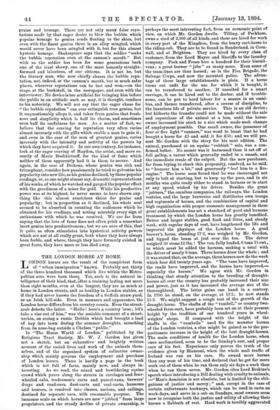THE LONDON HORSE AT HOME.
ONDON horses are the result of the completest form of "urban immigration" known. Probably not thirty of the three hundred thousand which live within the Metro- politan area were born there. Yet, such is the natural in- telligence of their kind, that, after a training lasting not more than eight months, even at the longest, they are as much at home in London streets, and as healthy in London stables, as if they had never known the freedom of a Suffolk straw-yard, or an Irish hill-side. Even in manners and appearance, the London horse differs from his country cousin. Even the street- -arab detects the latter. "Hullo ! here's a country 'orse ; let's take a rise out of him," was the amiable comment of a street- urchin, on seeing a rustic Dobbin which had brought a load of hay into town during the summer droughts, munching from its nose-bag outside a Chelsea "public."
In "The Horse World of London," published by the Religious Tract Society, Mr. W. J. Gordon has given not a sketch, but an exhaustive and brightly written account of the varied lives and work of the animals them- selves, and of the organised system of collective owner- ship vthich mainly governs the employment and purchase of London horses. There is hardly a page in the book which is not full of facts, mainly new, and always in- teresting. As we read, the mixed and bewildering equine crowd which pours along the streets in carriages and four- wheeled cabs, tradesmen's carts and parcel-vans, brewers' drays and road-cars, dust-carts and coal-carts, hansoras and hearses, is resolved into classes, nations, and callings, destined for separate uses, with reasonable purpose. The immense scale on which horses are now " jobbed " from large proprietors, and the steady decline of private ownership, is
perhaps the most interesting fact, from an economic point of view, on which Mr. Gordon dwells. Tilling, of Peckham, owns a stud of 2,500 of all kinds, and these are hired for work in every part of the Kingdom, from the heavy cart-horse to the riding-cob. They are to be found in Sunderland, in Corn- wall, and at Brighton. They are hired by every class of customer, from the Lord Mayor and Sheriffs to the laundry company. Peek and Frean hire a hundred for their biscuit- vans ; a great brewer " jobs " as many more. Even some of the tram-lines are thus horsed; so is the Fire Brigade, the Salvage Corps, and now the mounted police. The advan- tage of these large establishments is plain. If a horse turns out unfit for the use for which it is bought, it can be transferred to another. If unsuited for a smart carriage, it can be hired out to the doctor, and if trouble- some, can be put to hard labour for a season in an omni- bus, and thence transferred, after a course of discipline, to the luxurious life of private service. This is an old device; but hitherto the transfer could not be made without the sale and repurchase of the animal at a loss, until the horse- owner increased his stock to a size which made such change of employment possible. One small owner, the possessor of four or five light " vanners," was wont to boast that he had bought a horse for £5 and sold it for £50; and we will pre- sent Mr. Gordon with the story for his next edition. The animal, purchased at an equine " rubbish " sale, was a con- firmed bolter. No sooner was it harnessed than it set off at full gallop, a career which generally ended in a smash, and the immediate resale of the culprit. But the new purchaser, far from trying to check this propensity, resolved, as he said, to "humour him a bit," and generously "lent him to a fire- engine." The horse soon found that he was encouraged not only to bolt at starting, but to keep up the pace, and in six months was quite ready either to stand in harness or to start at any speed wished by his driver. Besides the great "jobbers," the omnibus companies, the railways, the London vestries, and the large breweries and distilleries own troops and regiments of horses, and the combination of capital and high organisation with proper economic management in these great establishments has set a standard of good and humane treatment by which the London horse has greatly benefited. Better and larger stables, good food and litter, and steady work, with regular days of rest, have lengthened the life and improved the physique of the London horse. A good brewer's horse, standing 17.2, was weighed by Mr. Gordon, and tipped the beam at just over the ton. The driver weighed 20 stone 12 lbs. ! The van, fully loaded, 6 tons 15 cwt., to which must be added the harness, making a total with the driver of nearly 8 tons. Three horses draw the whole ; and it was stated that, on the average, three horses now do the work which four did twenty years ago. "The vans have improved, the roads have improved, and the horses have improved,— especially the horses." We agree with Mr. Gordon in thinking that steady attention to the breeding of draught- horses all over the country has probably increased their size and power, just as it has increased the average size of the thoroughbred. The latter gains one hand in a century. In 1700 he stood, on the average, at 13 2 ; he now stands 153. We might suggest a rough test of the growth of the draught-horse. The shafts of the "tumbril," or country two- wheeled farm-cart, have probably been set on at their present height by the tradition of one hundred years in wheel- wrights' shops. If compared with the height of the shafts in the " tumbrils " used for the monster horses of the London vestries, a clue might be gained as to the pro- portionate increase in the height of the best draught-horses. The main conditions of health for the London horse, when once acclimatised, seem to be the Sunday's rest, and proper care of his feet. Experience only proves the truth of the evidence given by Bianconi, when the whole mail traffic of Ireland was run on his cars. He owned more horses than any man of his time, and declared that he got far more work out of them when he ran them only six days a week than when he ran them seven. Mr. Gordon cites Lord Erskine's speech when introducing a Bill dealing with cruelty to animals, —"Man's dominion is not absolute, but is limited by the obli- gations of justice and mercy ; " and, except in the case of certain unfortunate hackneys, which can be used in carts on week-days, and serve in a cab on Sundays, most owners seem now to recognise both the justice and utility of allowing their horses a Sabbath of rest. Hard work is terribly aggravated by any mischief in the horses' feet, most of the cases of ".cruelty" being due to working them in that condition. The ponderous hoof of the dray-horse crushes down upon iron or sharp stone, and at once drives the object deep into the foot. Iron nails inflict the worst injuries, and when " demolitions " are going on, or masses of broken material are known to be about to be carted through the streets, drags and vans are often sent by circuitous routes in order to avoid the nail-studded pave- ments. Proper shoeing is almost as important as daily foot examination for these bulky horses. "There is no animal more carefully shod than a brewer's horse," writes Mr. Gordon. "At Courage's, for instance, no such things as standard sizes are known. Many have a different make and shape of shoe on each hoof. The shoe is always made spe- cially to fit the foot, and these are never thrown away, but are mended—soled and heeled in fact—by having pieces of iron welded into them again and again. Some of the shoes are steel-faced ; some are barred, the shoe going all round the foot; some have heels, some toes; some one clip, some two. In fact, there are almost as many makes of shoes as in a Northampton shoe-factory."
Mr. Gordon has a separate and amusing treatise on nearly overy branch of the London horse-world, from the Queen's " Creams " to the funeral steed and the typical cab-horse. ilia story of the request that King William IV. would delay hastening to the House to dissolve Parliament in 1831, in order to give time for the cream-coloured State horses to have their manes plaited, and the King's reply, "Plait the manes ! -I'll go in a hackney coach," is part of the tradition of the Buckingham Palace stables. But the sequel of the indignant -coachman swearing at the guard of honour, and having to descend from the box and apologise after conveying his Majesty to the House, gives greater finish to the episode. The funeral horses are State steeds in their way also, and, like the Queen's cream-colours, are foreigners, or of foreign -extraction. But the creams are of Hanoverian descent. The "Black Brigade" are all Flemish, and come to London by way of Rotterdam and Harwich. There are nearly seven hundred in London ; and these are mainly the property of one or two large owners. "The jobmaster is at the back of the burying -world." One of these speaks very pleasantly of his black stud. "I am not a horsey man," says the undertaker, "but I have known this class of horse all my life, and I say they are quite affectionate and good-natured, and seem to know instinctively what you say to them and what you want. One thing, they -have an immense amount of self-esteem, and that you have to 'humour. Of course I have to choose the horses, and I do not -choose the vicious ones. I can tell them by the glance they -give as they look round at me." They are very fanciful as to their company, and if a coloured horse is put in the stalls -among them, the blacks at once turn fretful and miserable. Mr. Gordon has a fund of stories and experiences of the sale. 'rooms, the donkey-mart at Islington, and the export and -import trade. In spite of the imports from Poland, Finland, • Holland, and even America, and the pony trade with the Baltic, our export of horses enormously exceeds the import in -value. A three years' total gives £2,532,000 of exports, as -against 2804,000 of imports, and the quality and price of English horses rises steadily. The imports do not include -those from Ireland, which until recently supplied the entire 13elgian Army with remounts, and at present largely fill the ranks of London cab-horses. They fetch on the average -about £30 a-piece; and as a new hansom-cab costs £100, the 'hirer enjoys the temporary use of a capital of 2130, and the -services of the driver. But the number of cabs steadily -decrease, and, from the horses' point of view, this decline is -hardly to be deplored.







































 Previous page
Previous page